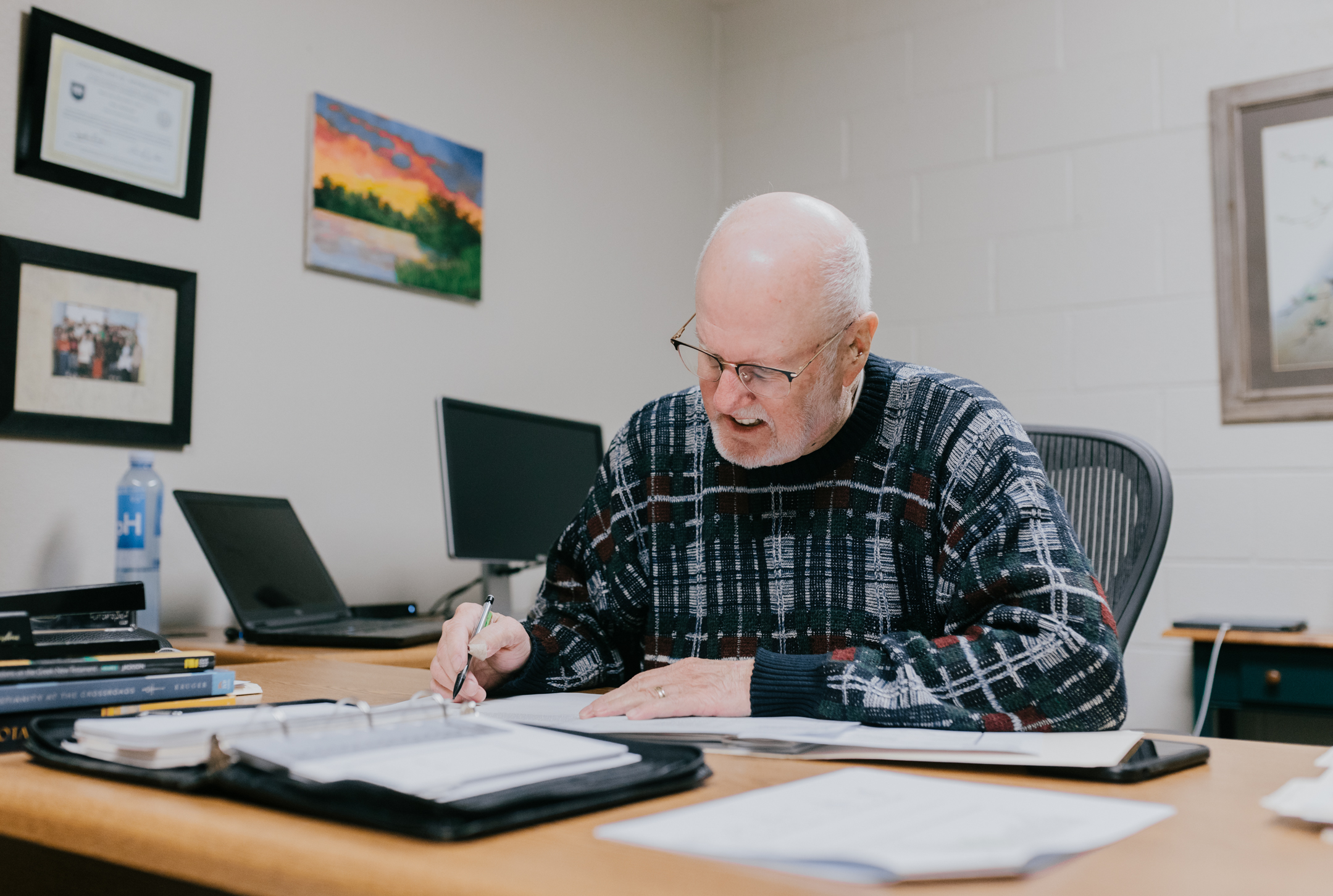
Editor’s Note: This story originally appeared in TMU’s alumni magazine.
Well, it’s January, and that usually means New Year’s resolutions. Perhaps we want to lose weight, or we want to go to the gym more often. We may want to have more consistent devotional times, or to be kinder to our spouse. Resolutions can be just about anything. The unfortunate thing about resolutions is they usually don’t last. Oh, we may try and keep them for a week or two, or maybe even a month, but eventually they end, and we go on with life like we never made them.
However, there’s nothing wrong with making resolutions or setting goals. We need to continually have goals or we will never grow, particularly on the spiritual front. I would like to recommend some goals, and not just for the new year, but for the rest of your life.
The first comes from Romans 12:2: “And do not be conformed to this world, but be transformed by the renewing of your mind” (LSB). These commands are both present tense and passive, which means we are to avoid being continually conformed by the world, and, we are to continually be transformed by the renewing of our minds. Both are given as an imperative we must be committed to.
The only way to be renewed in our minds is through the Word of God. So one key goal we should have is to be regularly in God’s Word so that the Spirit of God can be transforming us. There are 260 chapters in the New Testament, and if we read three chapters a day, we could read through the New Testament in three months. I think if we did that, the Holy Spirit would definitely be transforming our minds. And remember that the mind changes behavior, so our behavior would also be changing. It probably wouldn’t take more than 15-20 minutes per day to read three chapters.
OK, you decided to do this and read three chapters a day, and now you’ve completed three months. What do you do now? Start over again. If you continued this process, you could read the New Testament four times in a year. That would definitely have transforming effects on you and impact your life.
Let’s say you are really determined and want to read the entire Bible through in one year. There are 929 chapters in the Old Testament, so if you read three chapters a day there, you could finish reading in October and still have time left to read Proverbs, Psalms, or some other book again. What a joy it would be to read through the Old Testament once and the New Testament four times, and it would take you about 30 minutes per day. This would be a wonderful goal.

Dr. Halstead joined TMU’s Bible faculty in 1985.
The second goal, or set of goals, is found in 1 Thessalonians 5:16-18. It says, “Rejoice always; pray without ceasing; in everything give thanks, for this is God’s will for you in Christ Jesus.” While the first goal was action oriented, these goals are more attitudinal.
Rejoicing always is not based on outer circumstances but is rooted in the fact that the believer is “in Christ” and receives all the blessings flowing from that union. Christian joy flows from what the believer knows to be true about God and our relationship with Him. The word “always” is placed first in Greek and indicates that no matter what the trial or pain or affliction, our true joy in the midst of adversity will not only give God glory but will be an example for others to emulate. Look at some other passages that discuss joy:
“Consider it all joy, my brothers, when you encounter various trials” (James 1:2).
“We also boast in our afflictions” (Romans 5:3).
“In this you greatly rejoice, even though now for a little while, if necessary, you have been grieved by various trials” (1 Peter 1:6).
Think about that last passage: Peter says that we wouldn’t have trials if they weren’t necessary. Necessary for what? Necessary in God’s mind for our spiritual growth. In other words, everything we face is absolutely necessary, in God’s wisdom, for us. If it wasn’t necessary for us, it wouldn’t happen.
The second command is to pray without ceasing. Again, the emphasis is on “without ceasing.” What Paul means is that we must never stop praying regardless of the situation or circumstance. Paul said:
“Being devoted to prayer” (Romans 12:12).
“Praying at all times with all prayer and petition in the Spirit” (Ephesians 6:18).
“Devote yourselves to prayer” (Colossians 4:2).
The act of prayer is intermittent; the spirit of prayer should be constant. This will then manifest itself in repeated utterances of prayer to God. Our praying then will not be limited by time or place or restricted to set hours of prayer. We will be able to pray at any time, in any place, in any way, for anything. So if we’re driving to work and see an accident, we can pray for that. If we hear or read of a situation to pray for, we can do it immediately. It’s the attitude of being in constant prayer.
The third command, and a worthy New Year’s resolution, is to be thankful in all things. “In all things” is also emphatic and means that the Christian should not meet adverse circumstances with a stoic resignation, but with a spirit of unfailing gratitude.
When we realize that God works all things out for good to those who know and love Him and are submitted to His will (Romans 8:28), thanksgiving becomes a glorious reality for us. We cannot only say “amen,” but “hallelujah” also. Unthankfulness will lead to bitterness, but thankfulness will lead to humility and submission. We need to be known by our constant thankfulness, and this should characterize us even in times of great anxiety, fear, worry, stress, and affliction.
So, let’s set goals that will cause transformation in our lives: (1) reading the Word every day, (2) always rejoicing, (3) constantly being in an attitude of prayer, and (4) in everything giving thanks.
May God bless us all.
Dr. Thomas Halstead is dean of TMU’s School of Biblical Studies. You can learn more about TMU’s Bible department, here.

The Master’s University and Seminary admit students of any race, color, national and ethnic origin to all the rights, privileges, programs, and activities generally accorded or made available to students at the school. It does not discriminate on the basis of race, color, national and ethnic origin in the administration of its educational policies, admissions policies, scholarship and loan programs, and athletic and other school-administered programs.
21726 Placerita Canyon Road
Santa Clarita, CA 91321
1-800-568-6248
© 2024 The Master’s University Privacy Policy Copyright Info
| Cookie | Duration | Description |
|---|---|---|
| cookielawinfo-checkbox-analytics | 11 months | This cookie is set by GDPR Cookie Consent plugin. The cookie is used to store the user consent for the cookies in the category "Analytics". |
| cookielawinfo-checkbox-functional | 11 months | The cookie is set by GDPR cookie consent to record the user consent for the cookies in the category "Functional". |
| cookielawinfo-checkbox-necessary | 11 months | This cookie is set by GDPR Cookie Consent plugin. The cookies is used to store the user consent for the cookies in the category "Necessary". |
| cookielawinfo-checkbox-others | 11 months | This cookie is set by GDPR Cookie Consent plugin. The cookie is used to store the user consent for the cookies in the category "Other. |
| cookielawinfo-checkbox-performance | 11 months | This cookie is set by GDPR Cookie Consent plugin. The cookie is used to store the user consent for the cookies in the category "Performance". |
| viewed_cookie_policy | 11 months | The cookie is set by the GDPR Cookie Consent plugin and is used to store whether or not user has consented to the use of cookies. It does not store any personal data. |